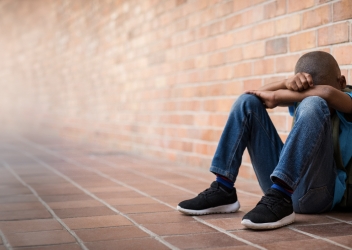Research In Action
Research In Action
Breadcrumb

Moderator’s Note: To celebrate the 10th anniversary of the Center for Violence Prevention (CVP) at Children’s Hospital of Philadelphia (CHOP), we will be highlighting CVP’s pillars and programs (including the people leading these programs) that help to reduce exposure to and impact of violence among youth and their families. To view our Aggression and Bullying Prevention Pillar feature, click here. Next up, we take a look at the Community Violence and Trauma Support Pillar.
CVP’s Community Violence and Trauma Support’s clinical and research programs promote physical and emotional health and safety for youth and families impacted by trauma or violence by providing assessments, emotional support, trauma-focused therapy, system navigation and connections to community services. Programs include:
- Violence Intervention Program (VIP): Works directly with violently injured patients ages 8 to 18 and their families to help them recover from injury, re-establish safety and navigate services in their community.
- Growing Resilience in Teens (GRIT): Assesses patients ages 8 to 17 at select CHOP primary care centers for post-traumatic stress symptoms, depression, anxiety and suicidality, and connects families with support services, including Family Advocacy and Support, when needed.
- Family Advocacy & Support (FAS): Assists families in navigating complex systems of care in Philadelphia and helps them recover from trauma or violence through an intensive program developed in partnership with CHOP’s Healthier Together Initiative.
- Building Resilience After Violence Experiences (BRAVE): Peer-led support group that promotes healing, positive coping skills and emotion regulation for patients ages 13 to 18 who have experienced traumatic events.
CVP’s dedicated efforts to change the trajectory of youth violence are complemented by training programs that help professionals do their work more effectively. An example of one such program is the Stress-Less Initiative© (SLI), a strengths-based, monthly peer support group that is embedded into a team, offering coping skills and strategies that mitigate secondary traumatic stress. SLI was developed by Dr. Laura Vega.
Meet the Community Violence and Trauma Support Pillar Leaders


Rachel Myers, PhD, MS and Laura Vega, DSW, LCSW lead this work to provide youth and families with support after they experienced trauma or violence. We recently caught up with them to learn about their careers in violence prevention research.
What is your title?
Dr. Myers: Associate Director, Center for Injury Research and Prevention at CHOP; Co-Director of Community Violence and Trauma Support at CHOP’s Center for Violence Prevention; Assistant Professor at the Perelman School of Medicine at the University of Pennsylvania
Dr. Vega: Co-Director of Community Violence and Trauma Support at CHOP’s Center for Violence Prevention
How long have you worked at CHOP?
Dr. Myers: I started my CHOP journey as a Student Research Assistant way back in 2002 and have been here ever since in various roles and positions.
Dr. Vega: I began at CHOP as a Master of Social Work intern in the Trauma Department. I was hired in 2013 and have worked with CHOP’s Center for Violence Prevention since then.
What is your favorite project on which you have worked and why?
Dr. Myers: I am most proud of how our Community Violence and Trauma Support programs are able to integrate strong clinical programming and service delivery with quality data that is collected with rigor. We are really setting the pace for what works to support young people and their families after violence and trauma, and it is exciting to be contributing to that work locally, as well as nationally.
Dr. Vega: We have developed a peer support group model called BRAVE (Building Resilience after Violent Experiences), and I love being part of this work. Any time you bring a group of teens together, the possibilities are endless! I love providing opportunities for youth to build community, grow and support one another. The youth in our programs are so amazing and inspiring!
What values drive your work?
Dr. Myers: If I had to pick just one, I’d say respect. This is foundational to how we interact with one another and how we approach patients and families. Valuing diversity of perspective, training and experience of everyone is vital.
Dr. Vega: I would choose the value of compassion. We implement a trauma-informed approach in our work, and I believe that having compassion for others (our patients and families, but also each other) is a big part of that. It’s important to give people the benefit of the doubt and to understand that people have a lot of stressors that often impact how they show up in different spaces.
What do you like to do outside of work?
Dr. Myers: I love going to Phillies games (and being tortured by their end-of-season antics) and spending time outside in our amazing network of parks.
Dr. Vega: I like to do anything that includes sun and water, and I have been working on my paddleboarding skills over the past few years. It is one sport where my shorter stature may be an advantage! I also enjoy spending time with family, friends and my puppies.
What is your “must-visit” spot in Philadelphia?
Dr. Myers: My current must-visit is the Southeast Asian Food Market in FDR Park. I can’t wait for the market to return in the spring!
Dr. Vega: When I was growing up, I had a lot of fond memories spending time at Pennypack Park with my dad in Northeast Philadelphia. I have not been there in some time, but we would walk along the creek, and I remember it being so beautiful and peaceful.



